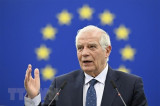Unpredictable prospect of the world economy
In a report to leaders of the Group of developed and emerging economies in the world (G20) before the G20 summit in India, the International Monetary Fund (IMF) identified that the global economy in the first quarter of 2023 has grown more positively than forecasted. However, its prospects are still unpredictable, both a great potential for recovery besides many diminished growth momentum signals.
The world economy has witnessed positive signals as many countries seem to have escaped from danger in the war against inflation, although they have not yet been able to reach their set goals. United States (US) statistics show that consumer prices in June saw the lowest annual increase in the past two years, which is a positive signal of the current state of inflation.
According to the US Department of Labour, the consumer prices of the world's largest economy increased slightly in June 2023 and it recorded the smallest annual increase in two years, but the pace of the inflation reduction may not be fast enough for the Federal Reserve (Fed) to raise interest rates at the upcoming policy meeting. Compared to the same period last year, the US consumer price index (CPI) rose 3% in June 2023, the lowest annual increase since March 2021, after rising 4% in May. However, core inflation has not returned to the right orbit, especially for the US service industry.
Meanwhile, the growth in many major economies is showing signals of slowing down. In China, recently released official statistics show that its CPI in the past June was almost zero, while the producer price continued to fall lower than expected. This is believed to be the latest signal of the wane of the world's second-largest economy.
The report from the National Bureau of Statistics of China (NBS) showed that its CPI in June fell from the rate of 0,2% recorded in the previous month, and also was much lower than experts' forecasts due to the slow-down in domestic demand. In June, China's producer price index (PPI) also fell 5,4%, higher than the decrease of 4,6% in the previous month.
In Europe, the financial services corporation Citigroup (US) recently lowered its economic growth forecast for 2023 for the euro area (Eurozone), in the context that the European Central Bank (ECB) still maintains its positive stance on rate hikes measures. Accordingly, GDP growth of this region in 2023 is forecasted to stand at 0,8%, down 0,3 percentage points compared to the previous forecast. The movement of adjusting the European economic growth forecast was given in the context that the continent's largest economy - Germany, also has seen its growth forecast lowered.
According to the IMF's assessment, manufacturing activities in G20 countries are performing poorly, while the global trade exchange is still at a low rate and demand for services is strong, especially in countries whose tourism industries are recovering. Although the IMF did not mention specific adjustments compared to the forecast of world GDP growth of 2,8% made in April, this financial institution supposes that the risks threatening the economy are progressing negatively, including the risk of an escalation of the Russia-Ukraine conflict, persistent inflation and increased financial pressures disrupting markets.
The IMF supposes that inflation seems to have peaked in 2022, with core inflation, which is easing gradually, still above the target in most G20 countries.
Supply chain disruptions and goods demand reduction mean that inflationary pressures related to commodities have also eased, but it may take longer to bring service inflation back under control.
In the context of many threats to the global economy, the IMF calls on the G20 countries to maintain their efforts to resist inflation and continue tightening monetary policy in some economies. The IMF has also warned policymakers to be cautious in relation to pressure signals on the financial sector and consider deploying financial policy tools to control risk.
NDO
 Bulgaria charts new course with Vietnam on President’s upcoming visit: Diplomat
Bulgaria charts new course with Vietnam on President’s upcoming visit: Diplomat
 Seminar seeks ways to boost ASEAN - Latin America connectivity
Seminar seeks ways to boost ASEAN - Latin America connectivity
 Indonesia seeks India's help in health education
Indonesia seeks India's help in health education
 Indonesia named world's most generous country in 2024
Indonesia named world's most generous country in 2024
 Philippines: Over-4m-high floodwaters make thousands of houses submerged
Philippines: Over-4m-high floodwaters make thousands of houses submerged
 Singapore’s public sector records carbon reduction in 2023
Singapore’s public sector records carbon reduction in 2023
 Pressure facing the EU on its growth track
Pressure facing the EU on its growth track
 Efforts boosted to combat transnational organised crime
Efforts boosted to combat transnational organised crime
 Nearly 200 terror suspects arrested in Indonesia in two years
Nearly 200 terror suspects arrested in Indonesia in two years
 Vietravel launches tourism joint venture in India
Vietravel launches tourism joint venture in India



